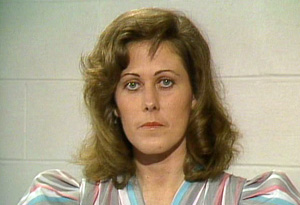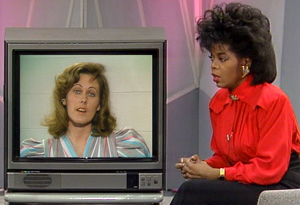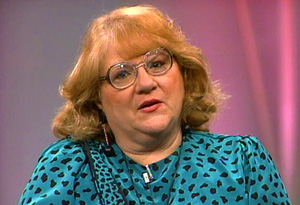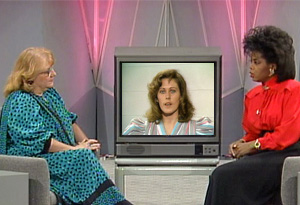Diane Downs' 1988 Prison Interview

Photo: September 26, 1988
On May 19, 1983, Diane Downs and her three children were shot on a rural road in Oregon. Police scoured the crime scene for months searching for the weapon, a .22-caliber gun that wounded Diane and her 8-year-old daughter Christie, paralyzed her 3-year-old son Danny and killed her 7-year-old daughter Cheryl. The gun was never found.
Early on in the investigation, police claimed Diane was responsible for the shootings of her children, but she publicly voiced her innocence, claiming that a shaggy-haired stranger shot them.
At the trial, Diane's surviving daughter, 9-year-old Christie, took the witness stand and testified that her mother was the shooter. Diane was nine months pregnant when she was convicted on one count of aggravated murder and two counts of attempted murder.
While in prison, Diane scaled an 18-foot razor wire fence and escaped from her Oregon cell in July 1988. There was a 14-state manhunt for her, which she eluded for 10 days. She was recaptured and sent to a New Jersey prison to serve the remainder of her life sentence.
Early on in the investigation, police claimed Diane was responsible for the shootings of her children, but she publicly voiced her innocence, claiming that a shaggy-haired stranger shot them.
At the trial, Diane's surviving daughter, 9-year-old Christie, took the witness stand and testified that her mother was the shooter. Diane was nine months pregnant when she was convicted on one count of aggravated murder and two counts of attempted murder.
While in prison, Diane scaled an 18-foot razor wire fence and escaped from her Oregon cell in July 1988. There was a 14-state manhunt for her, which she eluded for 10 days. She was recaptured and sent to a New Jersey prison to serve the remainder of her life sentence.

Photo: September 26, 1988
Diane still maintains her innocence to this day and joined The Oprah Show via satellite on September 26, 1988, to tell her story.
Diane: On the night of May 19, 1983, my children and I went to see a friend to take her a newspaper clip. On the way home, a stranger was in the road. I stopped because he was flagging me, and I thought he was in trouble or thought that he was hurt. When I stopped, he approached the car, and by the time I got out of the car, he was standing beside the car, and he assaulted us. He asked for my car, and I made a smart remark and perhaps I shouldn't have.
Oprah: What smart remark? What did you say?
Diane: Well, he said he wanted my car, and I said: "You've got to be kidding. That's crazy. You just don't do that." So he assaulted me and my children, and from that point, I took the kids to the hospital.
Oprah: Assaulted is a very mild term for what happened.
Diane: That's a nice way of saying he shot us. Right, very mild, but I suppose you'd have to see things from my point of view. It's a very difficult thing. I very, very rarely talk about what happened that night because it is so painful.
Diane: On the night of May 19, 1983, my children and I went to see a friend to take her a newspaper clip. On the way home, a stranger was in the road. I stopped because he was flagging me, and I thought he was in trouble or thought that he was hurt. When I stopped, he approached the car, and by the time I got out of the car, he was standing beside the car, and he assaulted us. He asked for my car, and I made a smart remark and perhaps I shouldn't have.
Oprah: What smart remark? What did you say?
Diane: Well, he said he wanted my car, and I said: "You've got to be kidding. That's crazy. You just don't do that." So he assaulted me and my children, and from that point, I took the kids to the hospital.
Oprah: Assaulted is a very mild term for what happened.
Diane: That's a nice way of saying he shot us. Right, very mild, but I suppose you'd have to see things from my point of view. It's a very difficult thing. I very, very rarely talk about what happened that night because it is so painful.

Photo: September 26, 1988
Joining the conversation is former policewoman and best-selling crime writer Ann Rule. She wrote Small Sacrifices, a book that tells the story of Diane's life. Diane, however, disagrees with many of the things that are written in the book.
One point of contention is Ann's claim that Diane became pregnant before her trial because she is fulfilled by pregnancy. "That is what I believe," Ann says. "Diane obviously disagrees with me."
Watch Diane talk about her pregnancy.
Diane says the reason she got pregnant was because it was a bad time in her life. "I was extremely lonely," Diane says. "I missed my kids desperately. I had just seen Christie on the 2nd of October, and it's like opening a wound and pouring salt in. I was extremely lonely beyond belief and beyond explanation. On October 13, I just went and got pregnant because I was so lonely."
One point of contention is Ann's claim that Diane became pregnant before her trial because she is fulfilled by pregnancy. "That is what I believe," Ann says. "Diane obviously disagrees with me."
Watch Diane talk about her pregnancy.
Diane says the reason she got pregnant was because it was a bad time in her life. "I was extremely lonely," Diane says. "I missed my kids desperately. I had just seen Christie on the 2nd of October, and it's like opening a wound and pouring salt in. I was extremely lonely beyond belief and beyond explanation. On October 13, I just went and got pregnant because I was so lonely."

Photo: September 26, 1988
During the broadcast of this show, viewers called in during breaks to question Diane's calm attitude while talking about such emotional subjects. "I have a personality that was developed over 27, 28 years, and you can't just shake that off," Diane says. "Yes, there are some very horrible things that happened in my life. Because of that, I closed up. I became less bubbly, less outgoing, less friendly, all those things. And I was therefore dubbed by the media as 'The Lady of Steel' because I seemed to have no emotion whatsoever."
Ann says she believes Diane suffers from three personality disorders. "Basically, she's anti-social, meaning no conscience, no remorse—so you can do what you want, and you never worry about it afterward," Ann says. "Secondly, she's histrionic, which I think she's demonstrated this morning, meaning she loves to be onstage. And third, the narcissistic personality disorder means the narcissist feels entitled to whatever he or she wants, and it doesn't matter who gets hurt."
But, Diane says, she does have strong emotions when it comes to her children. "It's very painful," she says. "It's painful knowing that my children are living in an environment and in a world of confusion and pain and not knowing what is going on."
Diane's daughter speaks out for the first time
Ann says she believes Diane suffers from three personality disorders. "Basically, she's anti-social, meaning no conscience, no remorse—so you can do what you want, and you never worry about it afterward," Ann says. "Secondly, she's histrionic, which I think she's demonstrated this morning, meaning she loves to be onstage. And third, the narcissistic personality disorder means the narcissist feels entitled to whatever he or she wants, and it doesn't matter who gets hurt."
But, Diane says, she does have strong emotions when it comes to her children. "It's very painful," she says. "It's painful knowing that my children are living in an environment and in a world of confusion and pain and not knowing what is going on."
Diane's daughter speaks out for the first time



